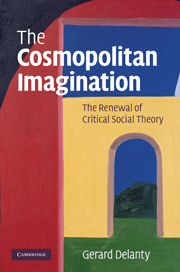Book contents
- Frontmatter
- Contents
- Preface and acknowledgements
- Introduction
- 1 The rise and decline of classical cosmopolitanism
- 2 Contemporary cosmopolitanism and social theory
- 3 Global ethics, solidarity and the problem of violence
- 4 Cosmopolitan citizenship and the post-sovereign state
- 5 Multiculturalism from a cosmopolitan perspective
- 6 Religion in a cosmopolitan society
- 7 Cosmopolitanism, modernity and global history
- 8 Cosmopolitanism and European political community
- 9 Europe as a borderland
- 10 Conclusion: inter-cultural dialogue in a post-Western world
- Bibliography
- Index
Preface and acknowledgements
Published online by Cambridge University Press: 18 January 2010
- Frontmatter
- Contents
- Preface and acknowledgements
- Introduction
- 1 The rise and decline of classical cosmopolitanism
- 2 Contemporary cosmopolitanism and social theory
- 3 Global ethics, solidarity and the problem of violence
- 4 Cosmopolitan citizenship and the post-sovereign state
- 5 Multiculturalism from a cosmopolitan perspective
- 6 Religion in a cosmopolitan society
- 7 Cosmopolitanism, modernity and global history
- 8 Cosmopolitanism and European political community
- 9 Europe as a borderland
- 10 Conclusion: inter-cultural dialogue in a post-Western world
- Bibliography
- Index
Summary
My intention in this book is to set out an argument for the contemporary relevance of cosmopolitanism for social science. More specifically my aim is to demonstrate the empirical and normative significance of cosmopolitanism for critical social theory. I have termed my approach critical cosmopolitanism to emphasize a dimension of cosmopolitanism that is not normally discussed in the now extensive literature on cosmopolitanism, namely the capacity for self-problematization and new ways of seeing the world that result when diverse peoples experience common problems. Against culturally oriented approaches, I see such problems as not cultural but social and economic and have significant political implications, which require a new kind of imagination – a cosmopolitan as opposed to national or market based ones – to address. The argument of this book is that such an imagination is present in the ways in which societies today, as in the past, have responded to the experience of globality.
In many ways this book is an expanded and re-worked version of an article on the idea of critical cosmopolitanism I published in 2006 in a special issue of the British Journal of Sociology on cosmopolitan sociology, edited by Ulrich Beck and Natan Sznaider, ‘The Cosmopolitan Imagination: Critical Cosmopolitanism and Social Theory’, British Journal of Sociology 57 (1): 25–47. Chapter 2 is a much extended and re-worked version of that article.
- Type
- Chapter
- Information
- The Cosmopolitan ImaginationThe Renewal of Critical Social Theory, pp. ix - xPublisher: Cambridge University PressPrint publication year: 2009



